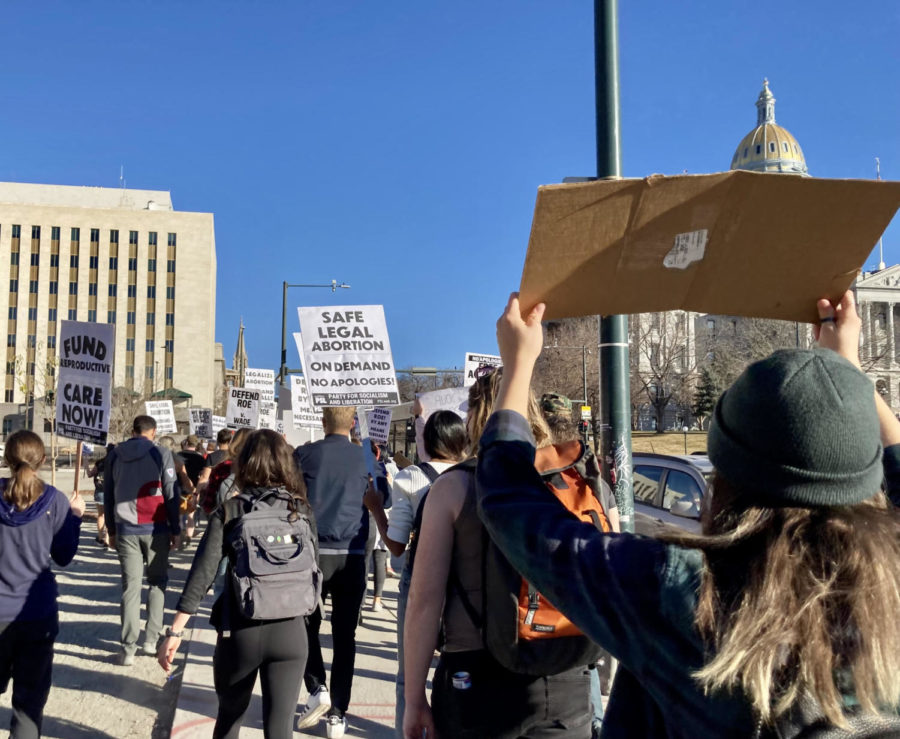A Post Roe v. Wade Colorado
After SCOTUS heard Dobbs v. Jackson Women’s Health Organization, protests sprang up around the country.
Last week, the Supreme Court heard a case that has the fate of Roe v. Wade– and thereby the fate of reproductive rights in the United States -thrown into uncertainty. Fifty years ago, in 1973, the Court decided that the right to an abortion was legal under the 14th and 9th Amendments. Since then there have been numerous attempts by states and individuals to reverse the precedent, notably including Planned Parenthood v. Casey in 1992. None, however, have been as much of a threat to safe abortion access until now.
Dobbs v. Jackson Women’s Health Organization, argued on December 1st, is unique not because of its premise but because of the Justices who heard the case. Trump nominated three (two with dubious precedent) of those on the current bench, shifting the Court to a conservative majority. The danger this posed to reproductive rights came to light after they refused to hear the case against Texas’ infamous six-week abortion ban (S.B. 8) this fall.
If the Dobbs v. Jackson Women’s Health Organization decision, set to come out this summer, effectively overturns Roe, the legality of abortion will be left to each state’s jurisdiction. Currently, 21 states have “trigger laws” which will immediately restrict reproductive rights following the removal of that precedent, according to a story by NPR.
Colorado, fortunately, is not a state poised to overturn abortion legality. In fact, Colorado has a long history of standing up for reproductive justice. Six years before Roe v Wade, the state legislature legalized abortion in limited cases, citing public health and safety. Since then, voters have continuously struck down restrictions to abortion rights, including a measure (“Prop 115”) as recently as 2020.
That’s not to say, however, that reproductive health care faces no threats in the state. In the liberal bubble of Boulder County, it’s easy to forget that Colorado was a red state up until around 2008. Organizations like “Focus on the Family,” which promote Evangelical views in American culture & politics, are based in the state. Kristi Burton Brown, Colorado’s GOP Chairwoman, expressed her support for S.B. 8 when it passed the Texas state legislature.
More important, perhaps, is that the anti-abortion measures Colorado voters strike down are continuously proposed. For a measure to be on the ballot, it must have five percent of the votes for the state Secretary-General from the previous election, a number which has reached over 124 thousand in recent years. Clearly, there is a public interest in keeping reproductive rights up for debate in Colorado- a fight that’s only going to become more prevalent following the likely outcome of Dobbs v. Jackson.
Colorado’s relatively liberal abortion laws don’t just impact the residents of the state itself. Following the implementation of S.B. 8, clinics in Colorado prepared for an influx of patients from Texas. Even in previous years, over 10% of abortions performed in the state were provided for out-of-state recipients, as reported by the CDC. Several states- including Utah, Idaho, Oklahoma and potentially Arizona -close to Colorado have “trigger laws,” making the possibility of a post-Roe wave of abortion patients post-Roe everything but inevitable.
Colorado’s relative reproductive freedom provides a model for the rest of the country (and the most compelling case for having safe and legal abortion access everywhere). From 2014 to 2017, the percentage of pregnancies ended in abortion in Colorado dropped 10 points, according to data from the Guttmacher Institute. This roughly coincides with the launch of the Colorado Family Planning Initiative (CFPI), which provides free or reduced-price long-acting reversible contraceptives- resulting in less cost for the state, fewer teen pregnancies, and fewer abortions, as stated by a report from a third party. Nobody is arguing that abortion rates should increase- people are just arguing that the way to decrease rates is to provide comprehensive sex education, affordable contraceptives and ensure that anyone can access abortion care.
When Colorado initially legalized abortion, it did so as a public health measure, not a reflection of political tides or feminist ideals. Women were dying after getting under-the-table procedures so state representatives voted to protect them. There are a plethora of reasons why abortion should remain accessible, but perhaps the most important is this: abortion will not end, but safe abortion will. An Atlantic article detailing the risk of illegal abortions stated that around 10% of maternal deaths in countries where abortion is outlawed are caused by unsafe abortion, despite the medical advantages of recent decades.
If (or when) the federal government ends protection for abortion access and lets states decide for themselves, Colorado will undertake the task of providing reproductive healthcare (including the benefits of CFPI) to far more patients. Other states should follow suit.

Hannah (rhymes with fauna!) Cohen is ecstatic to be working on the Owl for her third and final year. She loves stories in all their forms, but she mostly has opinions on obscure podcasts and which New York Times opinion columnists are defacing the good name of journalistic analysis. When not busy with stumbling through sheet music, editing nonfiction for jGirls+ Magazine, or seeking out the cheapest bluegrass venue, Hannah enjoys wandering around the mountains with her friends and lovely labradoodle. Although she's slightly preferential to the sweeter, more robust taste of red grapes, she knows that the bliss of biting into a crunchy grape transcends color.



